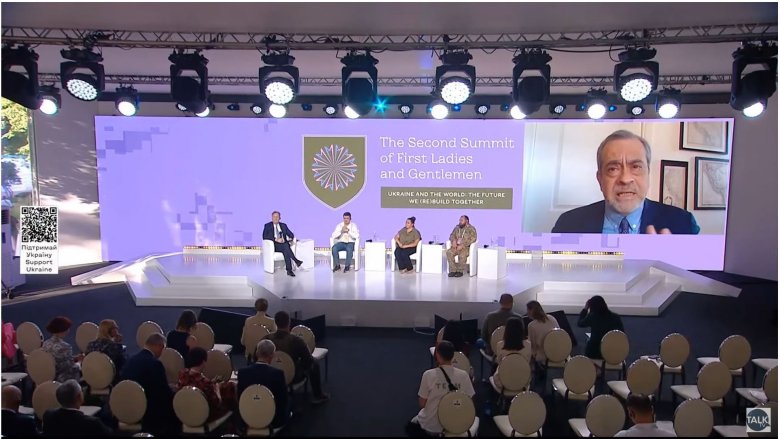I want to thank First Lady Zelenska for inviting me to participate, it is truly an honor.
I want to express my admiration to the people of Ukraine for its immense bravery, courage, and resiliency.
Education is the most powerful force for a peaceful and prosperous future.
It is completely unacceptable to deny the right to education to millions of children. To rob children of their dreams. Of their childhood. Of their future.
Before the pandemic, children and youth around the world were already experiencing a learning crisis. In fact, over half of children in low-and middle-income countries were living in learning poverty: they were unable to read and understand a simple text by age 10, by the end of primary education.
Then came the pandemic, the biggest global shock to education of the century. And children faced unprecedented school closures, which led to immense learning losses. Most countries, including Ukraine, have to face this silent crisis.
But Ukrainian children are facing an unthinkable, even deeper crisis. Because in addition to the COVID-related shock, they have now to deal with another shock: the Russian invasion. It is a dreadful tragedy.
This crisis must be addressed immediately. Every passing minute counts. Unless we act now, the war will have lasting and massive impacts on the future welfare and productivity of this generation.
The war in Ukraine is displacing students and teachers, destroying schools, and harming education delivery.
Almost 700,000 students and over 25,000 educators have been displaced. Over 2,000 education institutions have been damaged by bombing and shelling, and more than 200 of these have been completely destroyed. This is an unimaginable attack to education.
The Government of Ukraine and the Ministry of Education have taken bold actions to provide learning continuity.
They have expanded access to online learning platforms, provided psychosocial support for students, and simplified the university admissions process.
Also, thanks to the All-Ukrainian Online School digital platform that was established during the pandemic, around 85% of schools were able to complete the 2021-2022 school year.
The Government has facilitated academic mobility for higher education students, internally and across Europe.
But despite these efforts, the impact of the war on learning is severe, as the war decreases both the amount of instruction time children receive, and the quality of that instruction.
To safeguard the future of Ukrainian students, the World Bank is supporting education in Ukraine through various initiatives.
We are supporting the government to pay teachers�� salaries.
Second, we are dedicating US$100 million to the provision of scholarships for students in higher education.
Third, we are supporting an online tutoring program for displaced students in Ukraine. The program aims to recover learning losses and provide psychosocial support.
But, this is not enough. We estimate that the costs of recovery and reconstruction of the education sector in Ukraine amount to more than US$9 billion. To address the crisis, we need different ways to deliver the education services.
Damaged schools need to be reconstructed.
Remote learning must complement in-person instruction, to guarantee the continuity of learning.
Recovery must include remedial programs to help children catch up. Many children will be far behind grade-level expectations.
Psychosocial support is also imperative. Children have been isolated. They have experienced or witnessed violence, death, or illness.
ŷ����b��Ƭ is proud to stand with Ukraine. And it is great to see others here do the same. But make no mistake, the education crisis is severe and ongoing, and we have a long way to go to ensure children get the education they need and deserve. Each minute counts.
We call on world leaders to join us in supporting the children of Ukraine. Their future depends on our support. And the future of our societies depends on our children.

